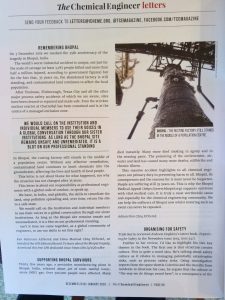 We wish to thank Adrian Finn for bringing to our attention the following two letters concerning Bhopal that were submitted to The Chemical Engineer in the December/January issue, the second of which he submitted himself. The letters serve as a reminder that Bhopal remains a landmark event that has not been forgotten among the chemical engineering community, and as recognition that there is still work to be done to clean up the contaminated site and support those still being affected by toxic groundwater today.
We wish to thank Adrian Finn for bringing to our attention the following two letters concerning Bhopal that were submitted to The Chemical Engineer in the December/January issue, the second of which he submitted himself. The letters serve as a reminder that Bhopal remains a landmark event that has not been forgotten among the chemical engineering community, and as recognition that there is still work to be done to clean up the contaminated site and support those still being affected by toxic groundwater today.
Remembering Bhopal
On 3 December 2019 we marked the 35th anniversary of the tragedy in Bhopal, India.
The world’s worst industrial accident is unique, not just for the scale of the carnage (at least 3,787 people killed and more than half a million injured, according to government figures) but for the fact that, 35 years on, the abandoned factory is still standing, and contaminated land continues to affect the local population.
After Toulouse, Flixborough, Texas City and all the other major process safety accidents of which we are aware, sites have been cleared or repaired and made safe. Even the stricken nuclear reactor at Chernobyl has been contained and is at the centre of a managed exclusion zone.
In Bhopal, the rusting factory still stands in the middle of a population centre. Without any effective remediation, contaminated land continues to leach chemicals into the groundwater, affecting the lives and health of local people.
This letter is not about blame for what happened, nor why the situation has not changed after 35 years.
This letter is about our responsibility as professional engineers with a global code of conduct, to speak up.
We have, in India, and globally, the skills to remediate the land, stop pollution spreading and, over time, return the site to a safe state.
We would call on the institution and individual members to use their voices as a global conversation through our sister institutions. As long as the Bhopal site remains unsafe and unremediated, it is a blot on our professional standing.
Isn’t it time we came together, as a global community of engineers, to use our skills to set this right?
Ken Patterson AlChemE and Fiona Mcleod CEng FICHemE, on behalf of the LBP Editorial Board. To learn about the Bhopal tragedy, download this free LBP dedicated issue:
Supporting Bhopal Survivors
Thirty five years ago, a pesticides manufacturing plant in Bhopal, India, released about 40t of toxic methyl isocyanate (MIC) gas. Over 500,000 people were affected. Many died instantly. Many more died choking in agony and in the ensuing panic. The poisoning of the environment, air, water and land has caused many more deaths, stillbirths and chronic illness.
This massive accident highlights to all chemical engineers our primary duty in preventing harm to all. Bhopal, its consequences and the reasons for it must never be forgotten. People are still suffering 35 years on. This is why the Bhopal Medical Appeal supports survivors with vital medical care. It is truly a most worthwhile cause and especially for the chemical engineering community. We can help the sufferers of Bhopal now whilst ensuring such an event can never be repeated.
Adrian Finn CEng FICHemE


